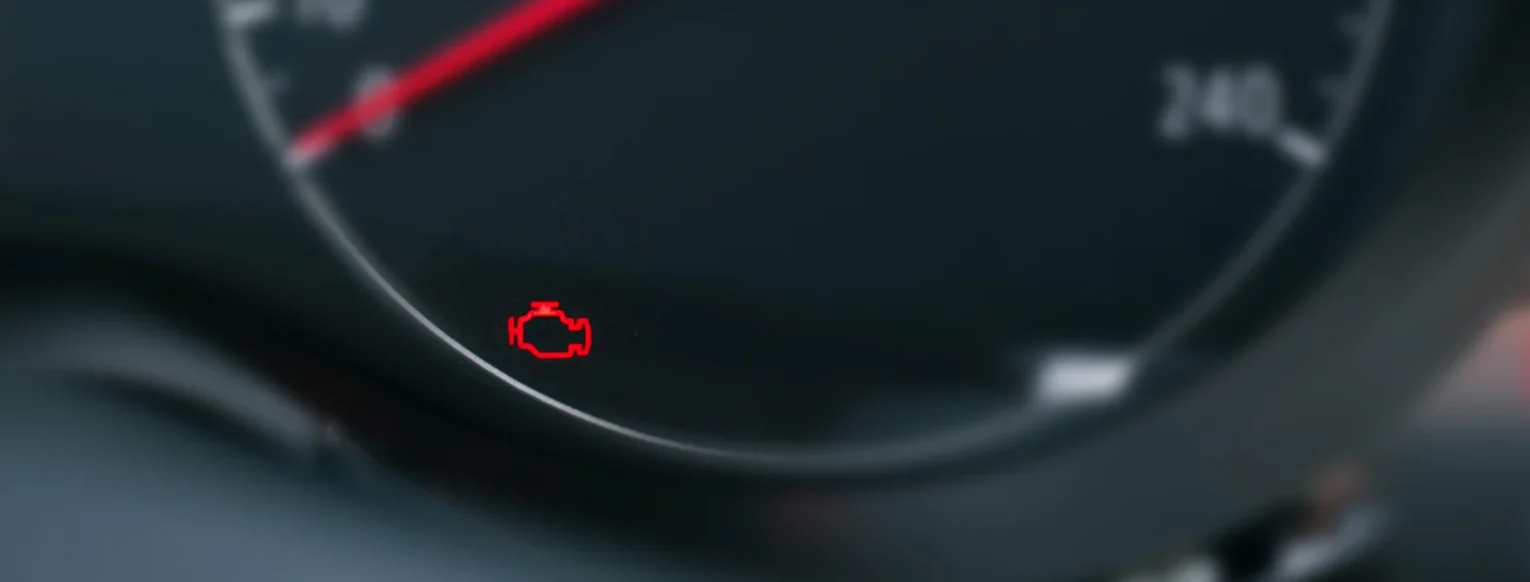The check engine light is a helpful and sometimes confusing feature included in vehicles. It’s helpful because it indicates when something is wrong with your car. It’s confusing because it’s not very specific and there are a lot of reasons it could be on. Sometimes the check engine light is triggered by something simple, like a loose gas cap. Sometimes it’s triggered by a more serious issue, like a problem with your catalytic converter.
Because there’s such a range in severity, some vehicles are equipped with check engine lights that flash or change color. A solid yellow or orange light may be an indicator of a less serious issue, and a flashing or red light indicates a more serious issue. Whatever the case may be, don’t ignore your check engine light.
Common Reasons for a Check Engine Light to Turn On
Loose Gas Cap
While a loose gas cap definitely ranks on the less serious side, it can still cause issues for your vehicle. If your check engine light has turned on and there are no obvious signs of car trouble, check your gas cap. Your fuel system is designed to be airtight and balance the fuel-to-air ratio in your engine. A loose cap can let gas vapors escape your vehicle and lead to increased emissions. This can also lead to the fuel in your tank evaporating before you have a chance to use it, thereby wasting your gas and money. Tightening your gas cap, or replacing it, is a quick fix that can make a big impact.
Faulty Oxygen Sensor
Your vehicle’s oxygen sensor measures the amount of unburned oxygen in your exhaust system. It helps to regulate the fuel-to-air ratio mentioned above. If your oxygen sensor is faulty or damaged, it can trigger your check engine light. It can also cause a decrease in fuel efficiency and an increase in emissions. Both are bad for the environment and your wallet. Have your oxygen sensor repaired or replaced to resolve the check engine light and get your car running smoothly again.
Faulty Mass Airflow Sensor
The mass airflow sensor measures the amount of air flowing into your engine. This also impacts your vehicle’s fuel-to-air ratio. Over time, the sensors may get dirty or damaged. This can trigger the check engine light, reduce engine performance, impact fuel efficiency, and cause problems with your vehicle’s acceleration. Depending on the issue, you may need to have your mass airflow sensors cleaned or replaced.
Issues with the Catalytic Converter
The catalytic converter plays an important role in your vehicle’s emissions system. It converts harmful pollutants into less harmful substances. Problems with your catalytic converter can trigger your check engine light and lead to a reduction in vehicle performance and an increase in vehicle emissions. It’s rare that your vehicle’s only problem is the catalytic converter. In most cases, an issue with the catalytic converter is also an indicator of further problems. It’s a good idea to have your vehicle thoroughly checked by a professional mechanic to ensure all issues are addressed.
Faulty Spark Plugs
Spark plugs and spark plug wires are essential components of your car’s ignition system. Over time, they can wear out and begin to fail. As this happens, your car will have trouble starting and your check engine light may turn on. To prevent this issue, have your spark plugs checked regularly and replaced as needed.
Faulty Ignition Coil
Similar to spark plugs, your car’s ignition coil helps to start your car. The ignition coil ignites the spark plug, which ignites the fuel in your car’s engine. Also, like spark plugs, the ignition coil can wear out and require replacement. If you notice the check engine light and your car is having trouble starting or accelerating, have your ignition coil checked. It may need to be replaced.
Worn Timing Belt
The timing belt synchronizes your vehicle’s camshaft and crankshaft. These work together to keep fuel moving into your engine and exhaust moving out of it. If the timing belt is worn down or damaged, it can lead a misfire in your engine which may trigger your check engine light. Issues with the timing belt should be addressed as soon as possible, as they can quickly become catastrophic.
Damaged Exhaust Pipe
Your exhaust pipe is part of your car’s emissions system. Due to its location on the undercarriage of your car, it can be susceptible to damage. A loose or damaged exhaust pipe may trigger your check engine light. It will also likely begin to make a hissing noise. If you notice this, address the issue quickly to avoid increasing your emissions, decreasing your fuel efficiency, and creating any further damage.
Low Fluid Levels
Your car has a lot of different fluids that help to keep it running. If certain fluids get too low, like the oil, transmission fluid, or coolant, you may see the check engine light turn on. Low fluid levels can cause damage to the various components they lubricate and cool. To prevent issues with your fluids, check them regularly and top them off as needed. If you notice one fluid that seems to lower faster than it should, or if you notice mysterious puddles under your car, you may have a leak that needs to be fixed.
Bad Tank of Gas
There are different grades of gasoline available at most gas stations. The most common are regular (with a low octane around 87), midgrade (octane around 89 or 90), and premium (which has the highest octane—somewhere between 91 and 94). There’s also diesel gas, leaded gas, and flex fuel or E85 that includes some amount of plant-based ethanol. Most diesel drivers know they drive a diesel truck. If, however, you have a car that runs on a certain grade of gas (like regular or premium) and you put the wrong grade in, this can trigger your check engine light. The best solution for this is to have your gas tank professionally drained so you can use the correct grade of fuel. If you have to drive until the tank is empty, keep an eye out for signs of poor engine performance or overheating.
Transmission Problems
Sometimes the check engine light will turn on for a transmission problem. This can happen if your transmission overheats or if there’s a problem with the solenoid or speed sensors. You might notice other signs besides the check engine light when the transmission is the cause for the light. Pay attention to any smells, shaking, delayed gear shifts, or other problem signs.
Can I ignore my check engine light?
While owners of used cars often make jokes about check engine lights, it is not something you should ignore. Even smaller issues can become bigger ones if they’re left unchecked for too long. Your car won’t pass inspection with the check engine light on, and your insurance may not cover damage caused by ignoring the light. If there are no obvious signs of engine problems, start by checking simpler things, like the gas cap and the fluid levels. If this doesn’t resolve the light, it’s time to call a mechanic.
Call Restored Auto, LLC for help with your check engine light.
If your check engine light has turned on and you’re not sure why, call Restored Auto, LLC. We can run diagnostics to locate the issue and resolve it for you. Don’t add to any damage by ignoring the check engine light. Call us today to schedule your vehicle maintenance.

